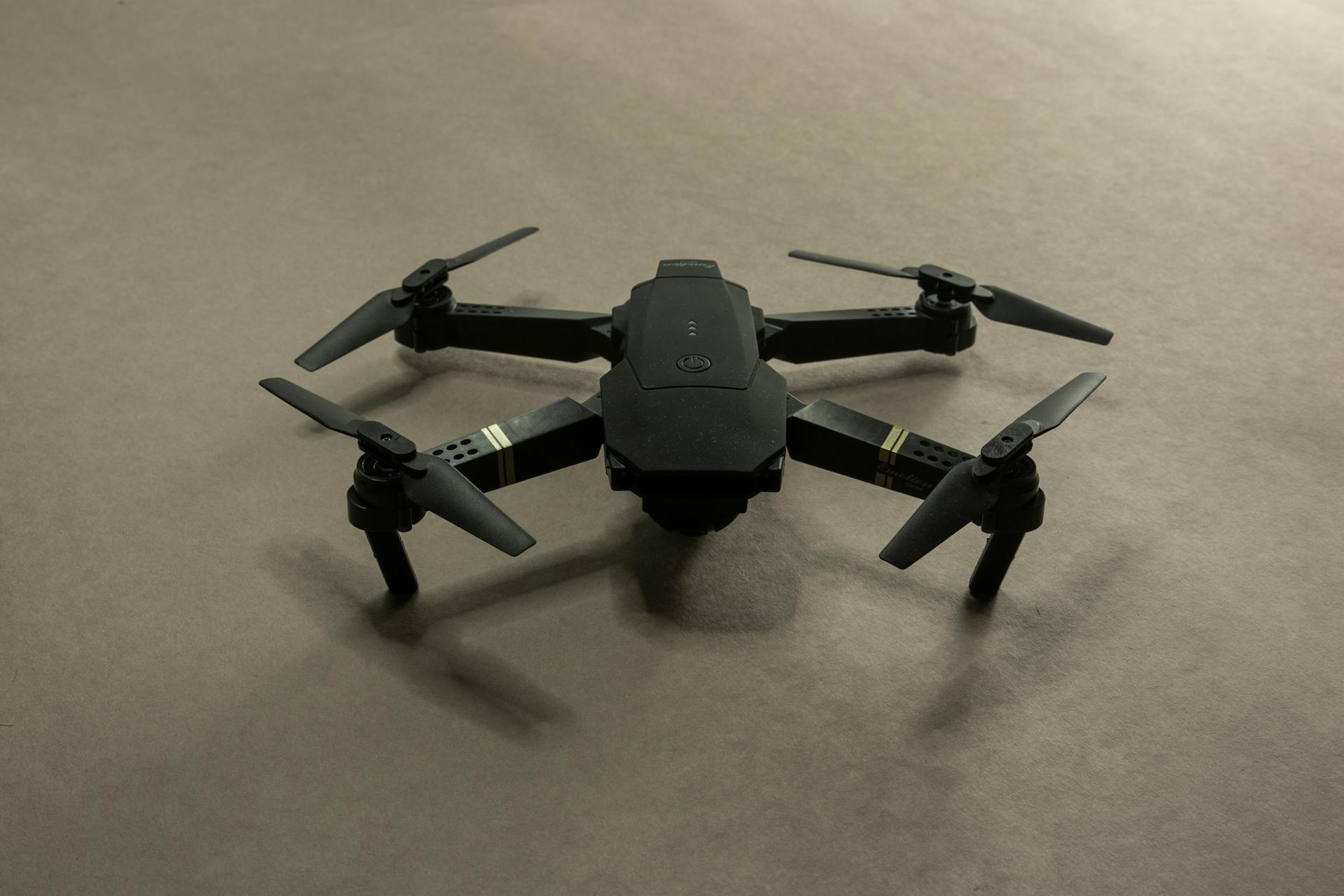
Pilotless aircraft are becoming increasingly popular, with many countries investing heavily in their development. The first successful test flight of an unmanned aerial vehicle (UAV) took place in 1916.
The use of autonomous flight systems has many benefits, including reduced costs and increased safety. The ability to fly without human intervention also opens up new possibilities for industries such as agriculture and construction.
Autonomous aircraft can fly for hours, even days, without human intervention. In fact, some drones can stay airborne for up to 24 hours.
What is UAS?
UAS stands for Unmanned Aerial System, which is a term used to describe a pilotless aircraft.
UAS systems consist of an unmanned aircraft, known as a drone, and a remote control system that allows the user to operate the aircraft.
These systems are often used for military and civilian purposes, such as surveillance, reconnaissance, and search and rescue operations.
Take a look at this: Joint Counter-small Unmanned Aircraft Systems Office
Overview
UAS has been around for over 30 years, with Textron Systems' Improved Shadow Tactical Unmanned Aircraft System (TUAS) being a prime example, boasting over 1.3 million flight hours, 85% of which were in combat.
The RQ-7Bv2 Block III is the latest configuration of the TUAS, and it's an all-digital system, optimized for new multi-mission, single-sortie profiles and manned-unmanned teaming.
Textron Systems' TUAS has supported the warfighter in some of the most challenging environmental conditions, demonstrating its reliability and effectiveness.
The TUAS is paired with Textron Systems' interoperable Universal Ground Control Station (UGCS) and remote products, allowing for collaboration across the battle space.
For a smaller expeditionary footprint, the TUAS can also be paired with a Portable Ground Control Station (PGCS).
Here are some key features of the TUAS:
- Improved Shadow Tactical Unmanned Aircraft System (TUAS)
- RQ-7Bv2 Block III configuration
- All-digital system
- Multi-mission, single-sortie profiles
- Manned-unmanned teaming
- Interoperable with Universal Ground Control Station (UGCS) and remote products
- Portable Ground Control Station (PGCS) available for smaller expeditionary footprint
UND Unmanned Systems
UND is a leading institution in unmanned aircraft systems (UAS) education, with 50 years of experience in aviation education, training, and research.
UND was the first university to offer a UAS degree in 2009 and continues to be a national leader in UAS education today.
The university has a unique program that provides expertise in unmanned aircraft to execute and manage applications in various fields, including military, firefighting, disaster relief, law enforcement, surveillance, aerial photography, and transportation.
UND is part of the Unmanned Aircraft Systems Collegiate Training Initiative (CTI-UAS) program, a long-term relationship with the Federal Aviation Association (FAA), ensuring that students are qualified to enter careers involving UAS.
The university's Grand Forks campus has been called the "Silicon Valley of unmanned aircraft systems" by the New York Times, providing students with opportunities to interact with small and large UAS companies and agencies.
UND students have access to a comprehensive UAS ecosystem, including internships with companies like Northrop Grumman, General Atomics, and Customs Border Protection.
Students can also work alongside UAS startups at the UND Center of Innovation, solving real-time problems and gaining hands-on experience.
UND offers a range of UAS-related courses, including industry trends, ground and flight systems, remote sensing, aerodynamics, human factors, safety, crew resource management, UAS law and policy, and more.
The university's UAS program is designed to provide students with the skills to perform and coordinate strategies in UAS operational environments, as well as solve problems as they arise.
UND is among the first institutions selected for the FAA's Collegiate Training Initiative for UAS, and has received the most FAA grants to study drones in 2021.
Take a look at this: Unmanned Aircraft Systems Companies
The university has also signed an agreement with the U.S. Department of Homeland Security to collaborate on UAS operations, training, and research.
UND's UAS program offers a minor in UAS Operations for non-aviation majors, allowing them to apply UAS knowledge to their specific discipline.
Here are some key areas of study in UND's UAS program:
- Project Management
- Strategic Planning
- Operations Management
- Commercial Operations
- Aviation Safety
UND's UAS graduates have gone on to successful careers with top companies, including General Atomics, Northrop Grumman Corporation, and Cargill.
UAS Education
The University of North Dakota (UND) offers a comprehensive Unmanned Aircraft Systems (UAS) degree that covers a wide range of topics, including human factors, crew resource management, autonomous systems, and safety management.
UND's UAS degree has two career tracks to specialize in: Low Altitude UAS Commercial Applications and Operations, and Medium/High Altitude Long Endurance UAS Commercial Applications and Operations.
The degree is accredited by the Aviation Accreditation Board International (AABI), making it a highly respected program in the industry.
Intriguing read: Remote Pilot Small Unmanned Aircraft Systems Study Guide
To give you an idea of the types of courses you'll take, here are some examples:
- UAS Flight Systems (AVIT 331): This course covers aircraft and ground operations, as well as mission requirements and their impacts on required systems.
- UAS Remote Sensing (AVIT 333): This course presents the theory and operations of common sensors used by UAS operators, and includes a lab portion on photogrammetry and data processing.
- Counter UAS Applications (AVIT 450): This course educates students on the emerging threat of UAS to national airspace and infrastructure, and covers current and future lines of effort in a unified approach to counter UAS.
- UAS Operations (AVIT 438): This course develops students' knowledge and skills in safely employing UAS, including aircraft operating software, launch and recovery operations, and mission planning and execution.
UND's UAS program is also known for its hands-on experiential learning, which allows students to work with the latest equipment and technology in the field.
Here are the two career tracks offered by UND's UAS degree:
UND's UAS program has consistently ranked among the best for educational quality, affordability, and career outcomes, and is a leader in the UAS industry.
UAS Careers
The future of flight is taking off in exciting ways, and pilotless aircraft are at the forefront of this revolution. With the rise of unmanned aircraft systems (UAS), a whole new world of career opportunities is emerging.
You can expect to find UAS operators in a variety of industries, including oil and gas, windmill inspection, construction, agriculture, military and defense, law enforcement, firefighting, transport, surveillance, aerial photography, and air and rescue.
UND's comprehensive UAS degree program prepares students for these careers, teaching them the strategic skills they need to succeed. The program includes courses such as UAS Flight Systems, UAS Remote Sensing, and Counter UAS Applications.
According to Salary.com, the median annual salary for unmanned aerial vehicle (UAV) pilots is expected to be high, with many graduates finding employment in top companies like General Atomics, Northrop Grumman Corporation, and Isight RPV.
Here are some potential career paths for UAS professionals:
- Oil and Gas
- Windmill Inspection
- Construction
- Agriculture
- Military and defense
- Law enforcement
- Firefighting
- Transport
- Surveillance
- Aerial photography
- Air and rescue
UND's UAS program has a strong track record of placing graduates in successful careers, with alumni working at companies like Cargill and ArgenTech Solutions Inc.
Sources
- https://www.textronsystems.com/products/improved-shadow-tactical-unmanned-aircraft-systems
- https://und.edu/programs/unmanned-aircraft-system-operations-bs-aero/index.html
- https://www.forbes.com/sites/suzannerowankelleher/2023/02/26/pilotless-autonomous-self-flying-planes/
- https://www.smh.com.au/traveller/travel-news/would-you-fly-on-a-plane-with-no-pilot-20230908-p5e36a.html
- https://avi-8.com/blogs/the-aviation-journal/autonomous-flight-the-future-of-pilotless-aircraft
Featured Images: pexels.com


